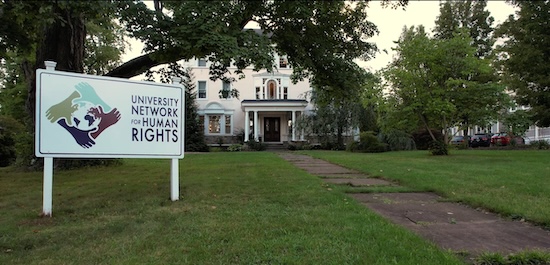
c/o University Network for Human Rights
After a five-day voting period ended on Monday, Feb. 3, the Wesleyan Student Assembly (WSA)’s Referendum Protecting the Partnership Between the University Network for Human Rights and the Human Rights Advocacy Minor passed with 97% of the 812 votes cast in support. The referendum was held after 637 students signed a petition in support of a student-wide vote on the issue.
The University Network for Human Rights (UNHR) is an organization based in Middletown, Conn., facilitating human rights education in universities throughout the country. The University partnered with the UNHR to create a Human Rights Advocacy Minor (HRAM) in 2021 on a three-year contract, which was renewed in 2024 by the Educational Policy Committee (EPC).
Despite the renewal, students enrolled in the HRAM program were informed in January 2025 of a potential termination of the UNHR partnership by the University. However, members of the administration have promised that the minor itself is not at risk.
“I’ve said from the beginning that we are committed to protecting the Human Rights Advocacy minor,” Provost and Senior Vice President for Academic Affairs Nicole Stanton said. “There are legal and financial problems in the relationship between UNHR and Wesleyan University that have not been resolved. Those have to be resolved in a way that results in a safe and sustainable program correct for our students.”
In response to the potential end of the partnership, students voiced their support for the program through the Wesleyan Student Assembly’s school-wide referendum. WSA senators hope that the results will be taken into consideration by the administration.
“The referendum is just a wider part of the calculus that the administration has to make,” Student Budget Committee Senator Nicolas Millan ’27 said. “And what it functionally does, in my opinion, is tell the administration that there definitely is student support; it’s widespread, and it’s unified. What the administration now has to contend with is literal, numerical evidence against them, and while it isn’t conclusive, and the administration can do other things, it definitely will play a significant part in the decision that they make.”
While Stanton reiterated that the referendum results have strengthened the University’s desire to come to a resolution on this issue, the administration maintains that their concerns regarding the practicality of the UNHR partnership has to be prioritized.
“Your positive experience certainly makes us work harder to figure out a really great solution, but it cannot make us [look] away from something if we know it to be unsustainable, unsafe, or unmanageable,” Stanton said.
Students have expressed concerns over the sway which WSA referendums have over the decisions of the administration, echoing last year’s controversies over divestment. In 2024, the Divestment and Disclosure referendum, in which 86% of the student body supported divesting from companies that provide weapons or other military support to the Israeli state, was passed. Despite this, the board of trustees’ Investment Committee rejected a recommendation submitted by the Committee for Investor Responsibility (CIR) to divest from companies charged with contributing to the Israeli occupation of Gaza and the West Bank. Supporters of the UNHR partnership worry that the University will repeat this trend.
“I highly doubt that the University administration will respect student voice in this context,” HRAM student Laila Azmy ’27 said. “We’ve seen it with the failed divestment referendum, in which students conveyed massive support for divesting from companies profiting from Israeli apartheid and genocide.”
Advocates like Millan hope that the University will come to a solution that maintains its unique partnership with the UNHR.
“There’s no other program in the United States of America that teaches human rights law and human rights advocacy to undergraduate students, and that’s just something that’s so incredible,” Millan said. “I think a lot of students are in disbelief that the University would even consider doing this, especially since it’s over a breach of contract that, at least to us, seems minor.”
Anabel Goode can be reached at agoode@wesleyan.edu.
Rahm Rodkey can be reached at rrodkey@wesleyan.edu.